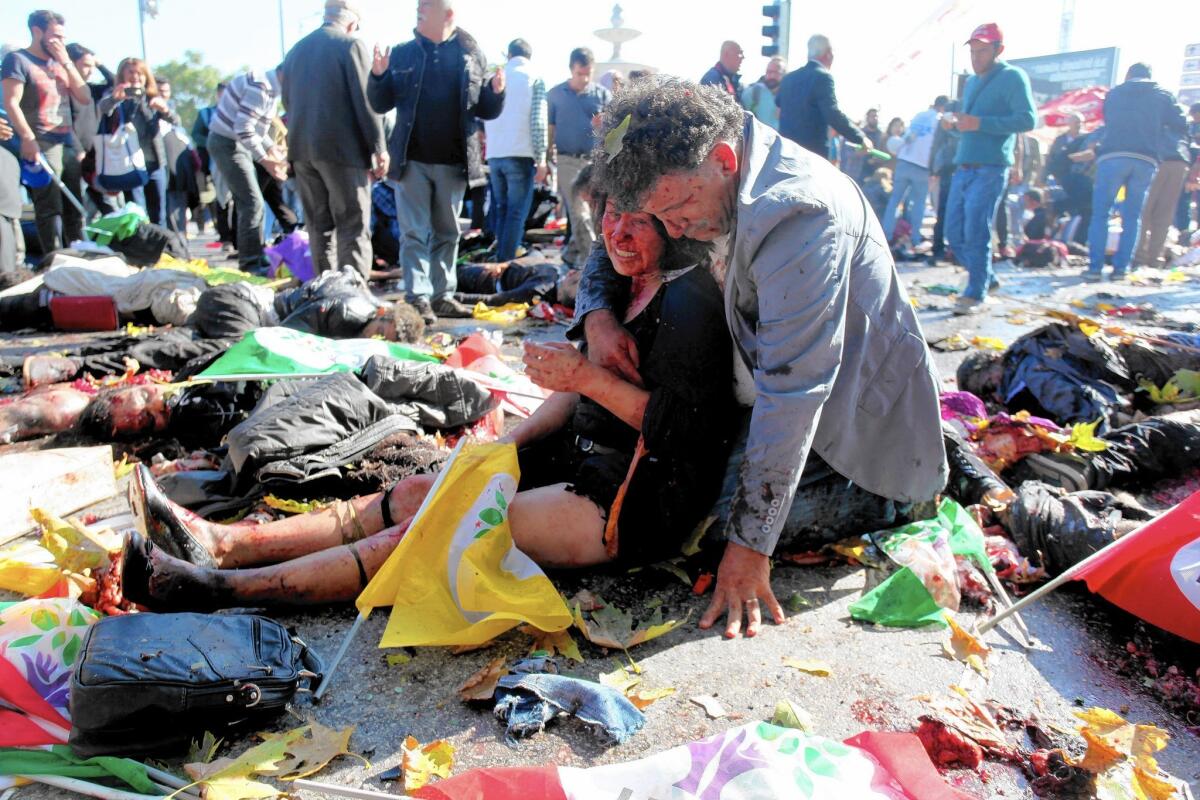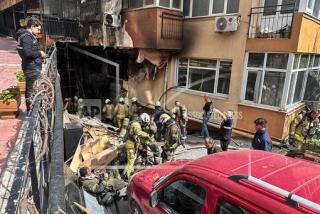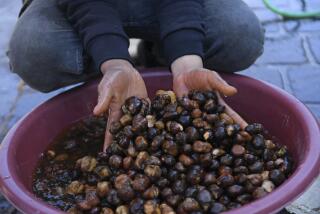Residents of Turkish town say warning signs were ignored as Islamic State lured their sons

In the deeply conservative backwater community that yielded Turkey’s most lethal terrorist cell, relatives and officials lament what they call grievous security oversights that allowed Islamic extremism to fester, resulting in a string of bombings that have killed 140 people and shaken this nation of 80 million.
Each of the three major attacks since June traces back to a group of about 20 twentysomething working-class men from Adiyaman who, according to authorities and relatives, were radicalized at a local tea shop and in neighboring Syria. They formed a home-grown Turkish cell of Islamic State, the Al Qaeda breakaway group that has seized vast stretches of land in Syria and Iraq.
With Turkey’s highly charged Nov. 1 parliamentary elections looming, the state news agency have reported that police were seeking four Islamic State operatives who entered Turkey from Syria and were planning a “major attack,” possibly a bombing or a hijacking of an airplane or ship. Three of the suspects are affiliated with the so-called Adiyaman cell, said the official Anadolu news agency.
NEWSLETTER: Get the day’s top headlines from Times Editor Davan Maharaj >>
Turkish officials have come under withering criticism for having missed various warning signs about the growing threat emanating from this agricultural hub of 200,000.
The extremists operated out of the since-shuttered teahouse here where they met, prayed and recruited in plain sight, despite numerous appeals to authorities to take action, relatives and opposition politicians say.
Young men from the town easily fell prey to extremist ideology, relatives say.
“The boys removed themselves from society,” said Ercan Gonder, whose cousin, Orhan Gonder, is now imprisoned, accused of planting a pair of bombs that killed five at a political rally in June in the southeastern city of Diyarbakir, the first in the series of deadly attacks. “They stayed in their group.... They were manipulated. Weaknesses in their personality were exploited.”
Wedged between the Kurdish heartland spreading east and the central Anatolian expanse to the west, Adiyaman has long been a religious city blighted by high unemployment and known largely for the production of quality tobacco. Visitors pass through on their way to the ancient caves of Pirin or to Mt. Nemrut, with its towering statues of ancient deities perched atop the province’s dusty ranges.
But with Syria’s descent into chaos, a new dynamic took hold. Militants from around the world began to descend on Turkey’s southeastern regions, founding international networks that extend to the nearby Syrian border.
For years, Turkish authorities backing the ouster of Syrian President Bashar Assad looked the other way as their nation was transformed into a militant transit zone. Adiyaman, a few hours’ drive from the Syrian frontier, was among the cities that became hotbeds of Islamic radicalism.
Scores of local men, and some women, ventured to Syria and joined Islamic State or other militant groups, residents and lawmakers say. Recruits grew long beards and shunned their families. Residents whisper of quiet funerals for those killed in Syria, their corpses ferried back across the border for inconspicuous interment.
But the hushed talk of the town’s radicalized cadres burst into the open after this month’s bombing that claimed 102 lives outside the main railway station in Ankara, the capital.
A few days after the Oct. 10 attack, authorities fingered an Adiyaman man, Yunus Emre Alagoz, as one of two suicide bombers in the Ankara bombing. The Alagoz surname was familiar. Previously, his younger sibling, Seyh Abdurrahman Alagoz, had been identified as the suicide bomber who killed 33 at a pro-Kurdish political rally in the southern city of Suruc on July 20. Both killers infiltrated crowds and detonated vests packed with explosives and ball bearings, authorities say.
The Alagoz brothers, along with at least 16 others from Adiyaman, had been investigated a year earlier for links to extremism, the Turkish media reported, and the phones of some had even been wiretapped. But all had been cleared, said the daily newspaper Hurriyet.
The cell members were denizens of the Islam Tea house, which became notorious here as a hub for fundamentalist Islam, a fact that angered many townsfolk opposed to the wave of radicalization.
Yunus Alagoz, the Ankara suicide bomber, reportedly managed the cafe for a time. The site was shut down about a year ago, residents said, after numerous complaints. Many of its habitues vanished into Syria, according to relatives and others here.
“They were very quiet, they did not disturb anyone,” one elderly resident, who did not want to be named for security reasons, said of the former teahouse patrons. “At night it would get crowded, they would sit and read the Koran. Many of the people who visited were dressed in laborers’ clothes.”
Sometimes he said, outraged parents would come to the tea shop late in the evening, dragging their grown children off by the scruff of their necks.
All three attacks to date have targeted rallies in support of secular pro-Kurdish parties. The pattern suggests that Islamic State views the bombing campaign not as a war against the Turkish government, but as an extension of the nation’s conflict with Kurdish factions in Syria and Iraq.
President Tayyip Recep Erdogan has strenuously rejected criticism that Ankara’s policies enabled the spread of Islamic extremism. The government has unleashed much of its military might against secular Kurdish militants, not against Islamic extremists.
Last week, Erdogan publicly scoffed at the possibility that Islamic State was solely behind the Ankara attack. The president labeled the strike “a collective terrorist action” involving cooperation among extremists from Islamic State, Kurdish militant factions — and even the Syrian secret police.
Critics here have rejected the notion that mutually antagonistic groups such as Islamist militants and secular Kurdish nationalists would collaborate to target pro-Kurdish nationalist gatherings.
Accounts from relatives and officials indicate that the young men of Adiyaman — many unemployed, most in their 20s — began traveling to Syria in the latter part of 2013, hooking up with various extremist factions. For the next year, recruits would move unhindered back and forth across the border, flaunting their militant credentials at the tea shop, according to relatives and human rights activists.
The initial instigator, authorities said, was Mustafa Dokumaci, a self-styled cleric who headed the Adiyaman cell, known to police as the Dokumaci Group. Dokumaci may have fled to Syria, according to Turkish media accounts.
“It started with just one person, but he influenced his family and friends,” said Behcet Yildirim, a parliament member with the pro-Kurdish Democratic People’s Party, from Adiyaman, which also has a large Kurdish population. “It rapidly grew wider and wider. It was quite clear there was a serious problem.”
Worried relatives and opposition politicians said they appealed to the police, reporting the disturbing trend of radicalization. But all say their pleas for intervention went ignored.
“I complained about them at the court but the prosecutors did not do anything,” Mehmet Dundar, an Adiyaman resident with two sons being sought as suspected Islamic State operatives, said in written testimony provided to a Kurdish human rights group more than two years ago.
“Some people brainwashed my children.”
Among some families, however, there is disbelief as police fan out and hunt down the renegade young fanatics of Adiyaman.
“My son was very young,” Zeynel Abidin Alagoz told the Dogan news agency, referring to Seyh Abdurraham Alagoz, 20, who struck Suruc in July. “He would not hurt a fly.”
Twitter: @mcdneville
Special correspondent Johnson reported from Adiyaman and Times staff writer McDonnell from Beirut.
ALSO:
Russian airliner carrying 224 crashes after takeoff in Sinai
California doctor convicted of murder charges in overdose of patients
Burbank man, 20, ejected from car lands on 5 Freeway sign in Glendale
More to Read
Start your day right
Sign up for Essential California for news, features and recommendations from the L.A. Times and beyond in your inbox six days a week.
You may occasionally receive promotional content from the Los Angeles Times.





